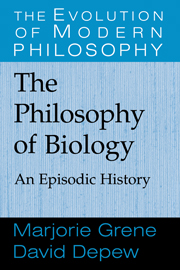Book contents
- Frontmatter
- Contents
- List of Figures
- Notes on Citations and References
- Acknowledgments
- Preface
- 1 Aristotle and After
- 2 Descartes, Harvey, and the Emergence of Modern Mechanism
- 3 The Eighteenth Century I
- 4 The Eighteenth Century II
- 5 Before Darwin I
- 6 Before Darwin II
- 7 Darwin
- 8 Evolution and Heredity from Darwin to the Rise of Genetics
- 9 The Modern Evolutionary Synthesis and Its Discontents
- 10 Some Themes in Recent Philosophy of Biology
- 11 Biology and Human Nature
- 12 The Philosophy of Biology and the Philosophy of Science
- References
- Index
8 - Evolution and Heredity from Darwin to the Rise of Genetics
Published online by Cambridge University Press: 05 June 2012
- Frontmatter
- Contents
- List of Figures
- Notes on Citations and References
- Acknowledgments
- Preface
- 1 Aristotle and After
- 2 Descartes, Harvey, and the Emergence of Modern Mechanism
- 3 The Eighteenth Century I
- 4 The Eighteenth Century II
- 5 Before Darwin I
- 6 Before Darwin II
- 7 Darwin
- 8 Evolution and Heredity from Darwin to the Rise of Genetics
- 9 The Modern Evolutionary Synthesis and Its Discontents
- 10 Some Themes in Recent Philosophy of Biology
- 11 Biology and Human Nature
- 12 The Philosophy of Biology and the Philosophy of Science
- References
- Index
Summary
Introduction
In the Descent of Man, Darwin admitted that, in his enthusiasm for what appeared to him a major discovery, he had perhaps overstressed the importance of natural selection. He now sees that there may be changes in the biota that are merely “chemical” – we would say, neutral – but, as he has always recognized, only adaptations are subject to natural selection. Still, Darwin's theory was, in his view, basically a theory of natural selection. Yet, paradoxically, as we noticed earlier, although the Origin persuaded many of the fact of descent with modification, it did not convince so many of natural selection as the chief agency of change. The Darwinism, or “Darwinismus,” of the Origin's first fifty years is certainly evolutionary, but it is scarcely recognizable as Darwin's theory. With respect to this period, Peter Bowler has written both of “the eclipse of Darwinism” (an expression introduced by Julian Huxley in his Evolution: The Modern Synthesis [Huxley 1942]) and of a “non-Darwinian revolution” (Bowler 1983; 1988).
However, the situation is more complicated than that. Before we move on to the evolutionary synthesis of the 1930s to 1950s and the philosophical questions associated with it, we need to identify some strands in that complex story. Again, as with Darwin, we will have to select a few points from a very rich subject-matter. Indeed, we are already restricting our account of the nineteenth century severely by focusing on evolution – let alone Darwinian evolution – and neglecting such topics as vitalism or the growth of the cell theory.
- Type
- Chapter
- Information
- The Philosophy of BiologyAn Episodic History, pp. 221 - 246Publisher: Cambridge University PressPrint publication year: 2004



